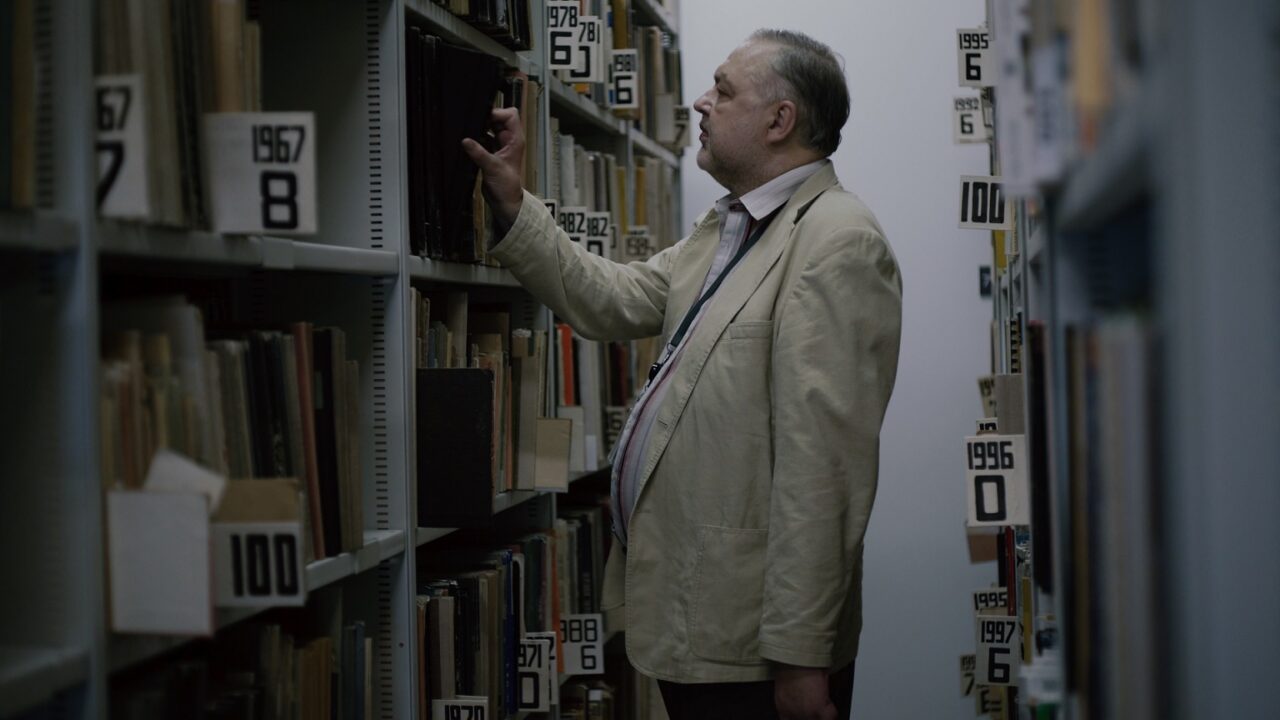
Andris Vilks, Director of the National Library of Latvia – on the topic of literature
After having invited Andris Vilks, the director of the National Library of Latvia, to participate in the Library project, not only did he accept the invitation and agreed to create a video story on the topic at hand, but also we received a letter, in which he had provided answers to our main questions: what is the meaning of literature and books in his life, and how has his relationship with the world of literature developed?
Andris Vilks writes in his letter
“It will come as no surprise that for me books, literature, including fiction, is both work and leisure. I learned to read at the age of 5. As I hear, today it is nothing special. At that time I was the first one in my kindergarten group. I read to others. Later I read a lot. In the sixth grade I began to read the “adult” novels. In the middle school I was completely captivated by Latvian poetry. Aleksandrs Čaks, whose complete works had just been published, became a cult poet for me. I read everything written by Ojārs Vācietis, Imants Ziedonis, Māris Čaklais, as well as Vizma Belševica, Knuts Skujenieks, who had just received the permission for his works to be published. I was very fond of the young authors of the time – Uldis Bērziņš, Leons Briedis, Māra Zālīte. A little later I exulted over the works by my contemporaries, who I also happened to know personally – Egīls Zirnis, Māris Melngalvis, Pēteris Brūveris, Klāvs Elsbergs. Thanks to my underground connections I was lucky enough to get hold of the typewriter edition of the poet of exile Olafs Stumbris’ poem collection “The Hour of the Squirrel”. Fortunately, I was smart enough to realise that my own writings were nowhere close to being suited for publishing, and discarded them completely.
It is quite a paradox, but I must say that reading fiction did not decide my choice of profession. I also read a lot on geography, history, art, biographies etc. Perhaps it all contributed to my choice to study the library science. There I met my other great love – a love for life, and it was the history of published books. I had tuned in for professional research, and the daily duties that the work in the Rare Book and Manuscript Department of the Latvian State Library was the right habitat for that.
Life had plans of its own, though. In 1989, becoming the director of now the Latvian National Library, I still remained in the environment of books and reading; however the systemic research was to be put aside for the time being. Every now and then I have managed to have the time for giving a talk, or publishing a paper. I am delighted for having had the opportunity to take part in preparing various publications, since my work has always required helping projects to be implemented. Perhaps one of the most sizable projects was the production of the facsimile edition of the album “Terra Mariana”, also supported by Baltic International Bank (and Mr. Valērijs Belokoņs personally).
Frankly speaking, it is not an easy task for me to advise anyone on what books should there be in their personal home library. In Latvia we have strong traditions of collecting books. Having begun in the monasteries, during the Reformation they became the foundation for one of the oldest public libraries in Europe. Later there were libraries in gymnasiums and schools, churches and monasteries. In the meantime “home libraries” emerged – at the premises of the Dukes of Kurland, and manors of the rest of the nobility of Kurland, Semigallia and Lettgallia. Already in the 18th century home libraries were devised also in the homes of Latvians – Jānis Šteinhauers in Riga had the pride in having one, as well as a group of educated or “enlightened”, as they say, Latvian peasants. In the 20th century almost in every home, be it a city apartment, or a country house, collections of books had been gathered.
Over the centuries, series of unfortunate events doomed many of the Latvian libraries to be lost and destroyed. Nowadays, for the very first time we come across the phenomenon of people no longer willing to collect books. It is influenced by the fact that libraries are much more accessible, people have become more mobile (changing their place of living more easily, no longer inhabiting a family household of several generations, etc.), and of course, unavoidably so, – the digital space for communication, and the digital content.
Regardless of that still there are books of excellent content and design being published, and the buzz for e-books at least in the existing format is now over. I very much support the slightly irrational attraction that the Latvians express for the printed (hard cover) books, therefore I advise to make well-considered decisions as regards to the book collections preserved by one’s grandparents, parents and themselves. I can fully imagine how many books seem to be out-dated for our time. Yet, I believe it is possible to form the core of the library that serves as a symbol of the intellectual heritage of the family ancestry, and in the meantime deems useful in the practicalities of life, which none of us is able to avoid (the so called professional literature). There will always be publications of inquiry (the Internet still doesn’t hold every answer), and fiction books suited for everyone’s taste, books to return to time and time again, or even books we wish that our descendants would read. In my opinion, we will see increase in publishing of books that are of esthetical value, where the contents and the form become one – forming an integral, tangible artefact.
As you can see, I cannot suggest any particular authors and their works, but I can express my assumptions as to the principles or guidelines according to which one might be willing to choose books for their library. There are books that I have inherited from my predecessors, and which I hold in high regard, books that I have received as a present, and books that I use daily. There are also those that I hope to have the chance to read once again in my life.
To be honest, I was amazed when I got acquainted with the complete list of works that have been published with the support of Baltic International Bank. There are a lot of books there! Yet what impressed me even more was the utmost quality of the published works. All the works are brilliant examples of contemporary literature both in content, and cover. These books are the jewels in the crown of the book publishing industry of our century. Mostly (with three wonderful exceptions – “Ulysess”, for example) these are original works of literature, in most cases in their first publishing. It is lovely after so many years to once again have the translations of remarkable literary works into Ukrainian. I am grateful for the published two fundamental compositions by our President Vaira Vīķe-Freiberga, and a book that has been sealed with the sign of Destiny – “I will not die” (a book about the life and works of Ilmārs Blumbergs).
At first, I was sceptical as regards to the project “We. Latvia. XX century”, which entails publishing of a series of books. I could not have imagined that it could turn out to be such a success, considering the fact that the works are “commissioned”. Moreover, the time frames being as if mechanically allocated to the various authors. In other creative industries, with some exceptions, there were no convincing victories in similar projects. Yet here – an exceptional series, outstanding novels! They have become popular among library users, and have become perpetuated in productions on the screen and stage. Oh, what a triumph did the novel by Nora Ikstena “Soviet Milk” experience in the London Book Fair! And there are other literary works from these series to be translated and published in foreign languages.
And finally, I would once again like to express my gratitude for the immensely valuable support for the publication “Terra Mariana”. All the “”big” facsimile editions have reached their addressees in Latvia and abroad. The “small” editions, ones that in fact are in no regard small, have been distributed to the Catholic parishes, educational establishments, libraries (also abroad), and museums. Also the Estonian respective institutions received a considerable share of this bestowment, since the contents of the album cover the whole territory of Livonian lands. Visitors, both local and foreign, of the Latvian National Library show their profound interest in the publication daily.
I am sincerely grateful for the support Baltic International Bank has provided for the initiative by the Latvian National Library Support Society – the very charming yet complex trilogy translated by Vilis Inde “Glass Mountain” (“Stikla kalns”) with the original translation into English of Rainis’ “Golden Horse” (“Zelta zirgs”). Baltic International Bank has bestowed one of the greatest gifts upon the literary community of Latvia, a gift for the centenary of Latvia, and most importantly – a gift to all Latvian society.”
